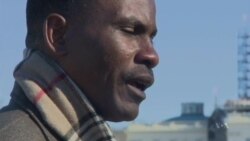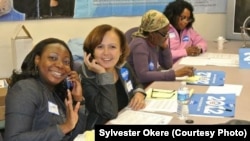On a crisp and cold day in Washington, standing on the steps of the Capitol building, Sylvester Okere says his African immigrant community has to educate itself now in how the outcome of this year’s U.S. presidential election is going to affect them.
"Many of us think that politics is only on the day of elections," said Okere, a Nigerian American. "This calls for us to be involved both in rallies, door knocking, [and] educating our community to get involved.”
Recently, the National Democratic Ethnic Coordinating Council (NDECC) voted unanimously to welcome African diaspora representation on the council, and Okere was appointed to fill the seat. He's also president of United People for African Congress (UPAC) to lobby and represent the African community in the United States.
He said everyone is busy, but if people have time to watch football games or go on social media, they should make time to get involved as well.
Okere praised social media platforms as "a very powerful tool to regroup and get our people galvanized.... We do have email data of our people we connect with, and phone numbers as well."
Superdelegate in 2012
Representing the state of Maryland, Okere was the first African immigrant superdelegate at the Democratic National Convention in 2012.
A superdelegate is free to support any candidate for the presidential nomination at the party's national convention.
“It was a very powerful excitement,” he recalled, “I was right there on the ground. I had access. Superdelegate gives you access to everywhere in the convention grounds…I was able to comb every nook and corner [cranny] of the convention. I met all the top class individuals that are there, the elected officials and everyone that came to the convention that I needed to talk to or see and ask questions, I was able to reach out to them.”
Okere does not know if he will be a superdelegate this year, but he does know who among the crowded field of presidential hopefuls he would support.
"I can choose any candidate, but for the interest of our community ... I would talk about Hillary Clinton," he said. "None of them has the information about other parts of the world like Hillary Clinton. She’s served as U.S. secretary of state and not only Africa, she knows everywhere."
Clinton's experience as first lady makes her even more qualified to Okere.
"I’ve been a CEO, I’ve been a recruiter and so forth. Before you hire someone, you want to look at their credentials, their resume and also the experience.… She qualifies," he said.
Top issues: immigration, economy
OKere said many Africans see immigration as the No. 1 issue in this election.
For him, it's the economy.
"I happen to be an ex-immigration officer, and I know the rules of dos and don’ts, and I know the importance of fear when you are in a land where you don’t know anybody," he said. "So the fear is there, but the most important thing is also economic flourishment because we all came here for one reason: education and to be able to better our homes. And there’s no how you gonna do it if you are not economically stable."
The African immigrant community has to lift itself up, he said, and that means getting into politics.
"We had to be on the move, get involved, join other communities, be part of it," because "politics is defining how we live and what we do," he said.
Okere said he worked in 2012 to help elect President Barack Obama by knocking on doors, talking to people in Metro subway stations and providing his office for phone banking, even driving people to election polling centers.
But he said it paid off because Obama won.






